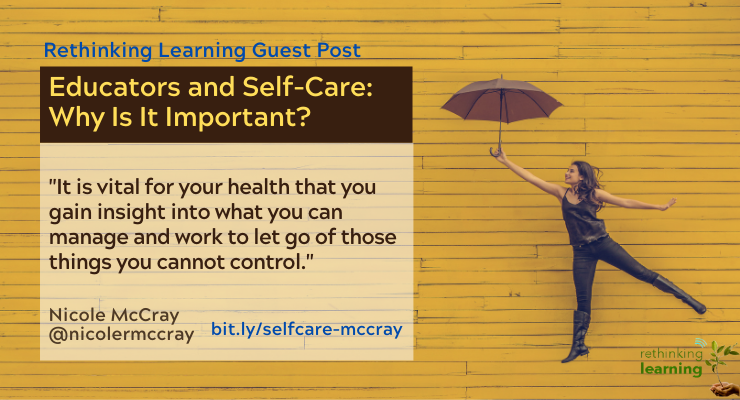
As a teacher, administrator, or parent, you have a very intensive job. This isn’t including everything else that comes after the job – taking care of family, cleaning your home, hobbies, and more. Not to mention all of the changes that we have had to navigate due to the coronavirus pandemic over the last year.
During stressful situations or times like these, it is entirely understandable to experience feelings of being overwhelmed. In this case, you may need a reminder that practicing self-care is essential. It provides us with a “step-back” mentality to get ourselves in a better mindset with calm and clarity.
Here are some great tips and ideas on how to give yourself some care or even finding the time to do so that you can start practicing right now.
GIVE YOURSELF PERMISSION
One of the biggest obstacles that we face as teachers and parents are that we do so much caring for others’ well-being that we forget that we need to care about ourselves. The first step to providing yourself with care is to give yourself that permission to do so. Education calls on some of the most dedicated and hard-working people, but that also leaves us very prone to burnout.
In a position where physical, emotional, and mental demands are high – how can we continue to give it our all every day when we have not taken care of ourselves? Many of us will give too much of our time and energy without paying mind to what we need first.
WHY IS SELF-CARE IMPORTANT?
Developing self-care is essential for our overall well-being. It helps us create calm and refresh our mindset and is linked to reducing anxiety, stress, depression, and more. The idea that everything has to be “perfect” or feeling like you aren’t doing enough or providing enough can also be reset with the proper use of self-compassion.
Self-compassion means treating yourself with kindness, patience, and understanding. Give yourself some empathy without feeling selfish or guilty. This can help you see your mistakes or mishaps as opportunities to learn and grow and give yourself some care that it is alright not to do everything perfectly. We all make mistakes.
ACTIONABLE STEPS TO SELF-CARE
So what is it that you can do, starting right now, to provide yourself with some self-care? Here is a compiled list with examples to show you just how you can.
- Find What Makes you Happy – you may want first to write down some things that you know will help you feel better on any given day. This could involve doing things like taking some time to read a book, watching a movie, taking a bike ride, etc. Find a way to fit at least one of these hobbies or activities into your week continually, so you.
A lot of times, it can also help us to define our “why” – as in, why do we do what we do? The easy answer is that we love it. However, when it is causing us stress and overwhelm, we need to refocus back to that “why” and re-center our focus that we want to provide a joyful, positive, and empowering experience for our students and children to learn and grow. Without taking care of ourselves, it becomes challenging to provide that, and our students can see it, too.
- Give Yourself a Break! – You work all the time. You barely have time to be done with work when your at-home list is telling you to get laundry in the wash or start cooking dinner – before you’ve even had a chance to sit down. Take a break and give yourself just 5-10 minutes of uninterrupted quiet. Reclaim some time for yourself, even if it’s just a little bit.
Exercise is a great refresher that helps. For example, when working on providing students with piano lessons for beginners, piano teachers constantly use their hands to explain specifics in fingering and placement. When piano teachers take a break, they might try doing some simple hand stretches or forearm exercises to work out the tension that comes with the job.
- Set Boundaries – Routines are fundamental and crucial. Chances are you stick to a pretty strict lesson-planning or activity regiment during the week during your work hours. Create the same type of routine for your self-care, such as specific break times or specific commitments within your schedule during the workweek yourself to provide for your well-being actively.
- Let Things Go – This is one of the most challenging things to do. Worrying and having anxiety over the things that we cannot control is hardwired, especially with those in the educational field. It is vital for your health that you gain insight into what you can manage and work to let go of those things you cannot.
Example here – students have to do more distance learning with their schoolwork, and music lessons being online during the pandemic created some difficulty since it requires doing the work from home. But there is no control over the logistics; only how you will apply to help those students learn as best they can in the situation at hand.
- Be Grateful – Having gratitude for all of the beautiful moments in your life is another critical factor in providing self-care. Recognizing those things that happened each day that were good and happy helps to elevate your feelings, especially on those tough days. Take in all of those little moments of joy because they mean so much.
Often, educators keep a gratitude journal or a journal of some kind so that they can record all of those good moments and have something to look back on when times are rough. Specific instances when you saw a student achieve a milestone or work with your encouragement can make all the difference in your mood.
PAY ATTENTION TO YOURSELF
Before you begin to go through these steps, it’s important to be mindful and present within the moment for you to assess your feelings throughout the day. If or when there are specific things you can pick out or identify that are causing you pain or suffering – address and find resolutions to these things as soon as possible.
Prioritize your time to include your breaks or moments of meditation or gratitude. Find those things that bring you happiness, and be sure to incorporate them. Learning to take better care of ourselves only enables us to continue to educate and parent, doing what we love the most without the fear of exhaustion or getting to the point of intolerance.
We must learn to take care of ourselves so that we can effectively and efficiently take care of others. Our students and children will greatly appreciate it!
*****
Nicole McCray
Content Creator, Word Warrior
Portfolio | LinkedIn | Twitter
 Before having her kids and shifting her career toward teaching students how to play their first instrument, Nicole was pinching pennies in her 20s while singing at dive bars and coffee shops across the country. She took what she learned from those formative years ‘on the road,’ and now spends her days contributing to music blogs, penning new songs, and learning new production skills. She finds great joy in sharing her insight with other musicians trying to make it in the industry.
Before having her kids and shifting her career toward teaching students how to play their first instrument, Nicole was pinching pennies in her 20s while singing at dive bars and coffee shops across the country. She took what she learned from those formative years ‘on the road,’ and now spends her days contributing to music blogs, penning new songs, and learning new production skills. She finds great joy in sharing her insight with other musicians trying to make it in the industry.
*****
Interested in checking out more of the Rethinking Learning blog posts go to the left sidebar. There are also blog posts that go with podcasts and reflections, so click on the podcast tab at the top, the logo below, or go to https://barbarabray.net/podcasts/
For more information about Barbara’s new book, Define Your WHY, go to this page or click on the image of the book for resources, questions, and links.




